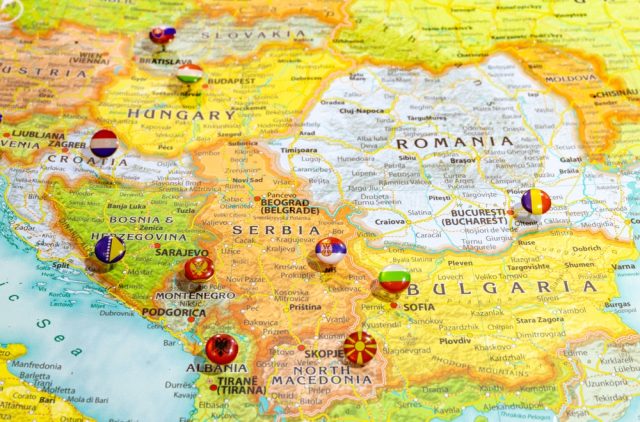
In the context of the war in Ukraine, the countries of the European continent have been looking for a year for alternatives to survive the Russian threats of energy cuts. In the same vein, in recent weeks some news has come to light that gives a glimpse of the situation in the region closest to and most dependent on Moscow: the Balkans. The European Conservatives and Reformists Party (ECR) has recently published the report The Future of Baseoad Energy in the Balkans, which analyses the situation of the energy sector in South-East Europe and its response to the needs of the population.
The report is based on the analysis of all renewable energies (geothermal, hydro, hydroelectric, biomass, solar, and wind), fossil fuels (natural gas, oil, or coal), and nuclear energy; to check the socio-political implications of the proposals of the European Green Pact, the so-called “Green Deal”, which aims to close down energy production companies for not complying with its stifling environmental requirements.
Southeast European countries are gearing up to be an alternative to Russia. Serbia has approved an 8.5 million euro grant to the Serbian transmission system operator Elektromreža Srbije (EMS) for the construction of the fourth section of the Trans-Balkan Corridor by 2025. The intention of this corridor, in addition to increasing electricity transit in the area, is to interconnect the various energy systems in the region. It will link the territories of Bulgaria, Hungary, Romania, Serbia, Bosnia and Herzegovina, and Montenegro. In this context, the ECR report concludes that the Serbian efficiency level is very low compared to the other countries because energy consumption is much higher than the national supply. Therefore, a Trans-Balkan corridor measure would help Belgrade to be able to supply its population’s consumption efficiently and without dependence on Russia.
Thus, the ECR report analyses the situation in all the Balkan countries, which encompass 777,000 square kilometres and a total of 65,000,000 inhabitants, and for some, green transformation is a priority, such as Slovenia. Slovenia has accelerated efforts in recent years to increase its renewable energy production to the detriment of local opposition to this measure. Similarly, Bulgaria continues to reduce coal production and replace it with renewables. Meanwhile, the Bulgarian government plans to rely on nuclear power, the dominant energy source in Bulgaria, to meet the country’s electricity demand.
Albania, on the other hand, has the largest cascading hydroelectric power plant in the Western Balkans, built on the Drin River; it also has enormous wind energy potential in the country. Baku receives between 2,100 and 2,700 hours of sunlight per year, making it a solar energy powerhouse and contributing to its geothermal energy production from the heat generated by the earth near the Greek border. Athens, for its part, has experienced a boom in recent years due to foreign investment, which has given it the opportunity to adapt its infrastructure and create projects that connect the country with Egypt to import its renewable energies, or with Israel or Cyprus to promote cooperation between them. In recent months, Greece has launched the construction of a new power plant in the north of the country to connect it to Europe and increase its electricity export potential and gain greater energy independence. Bulgaria will be the first country to receive Greek electricity in this way, scheduled for 2026.
However, not all countries are thriving in this respect. The report, The Future of Baseload Energy in the Balkans, shows the poor air quality in Bosnia and Herzegovina as monitored by various non-state organisations. In the same vein, Croatia has no coal resources of its own, despite producing oil and gas. It is also relatively dependent on electricity imports, as is Montenegro, which, although a country with great potential for development in this area, is completely dependent on other powers in all energy sectors. Similar is the situation in North Macedonia, which is dependent on fossil fuels and hydropower, as well as electricity.
Finally, the report reveals that Romania’s energy sector is key to the evolution of its economy and security policy. The country has an energy matrix based on natural resources such as renewable energy, as well as gas and nuclear power. So much so that Bucharest plans to build two hydroelectric power plants on the Danube together with Bulgaria for joint use. Both countries intend to intensify the construction of new bridges between them to increase interconnection, facilitate trade by road and, above all, guarantee their energy independence.



 Subscribe
Subscribe